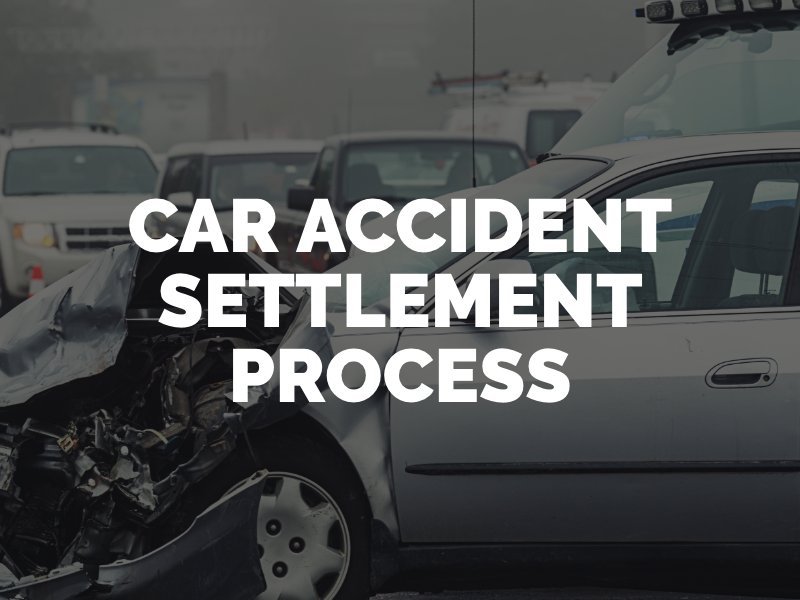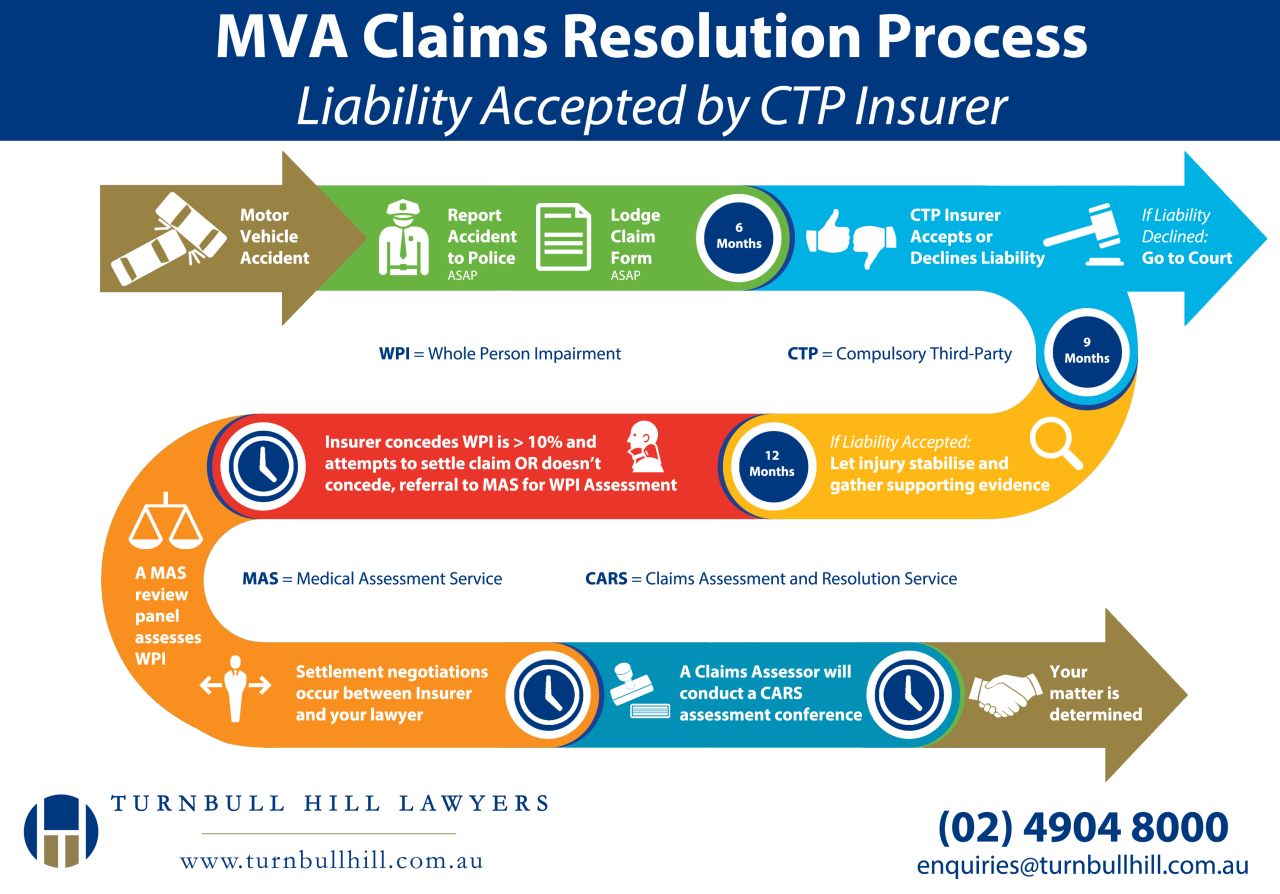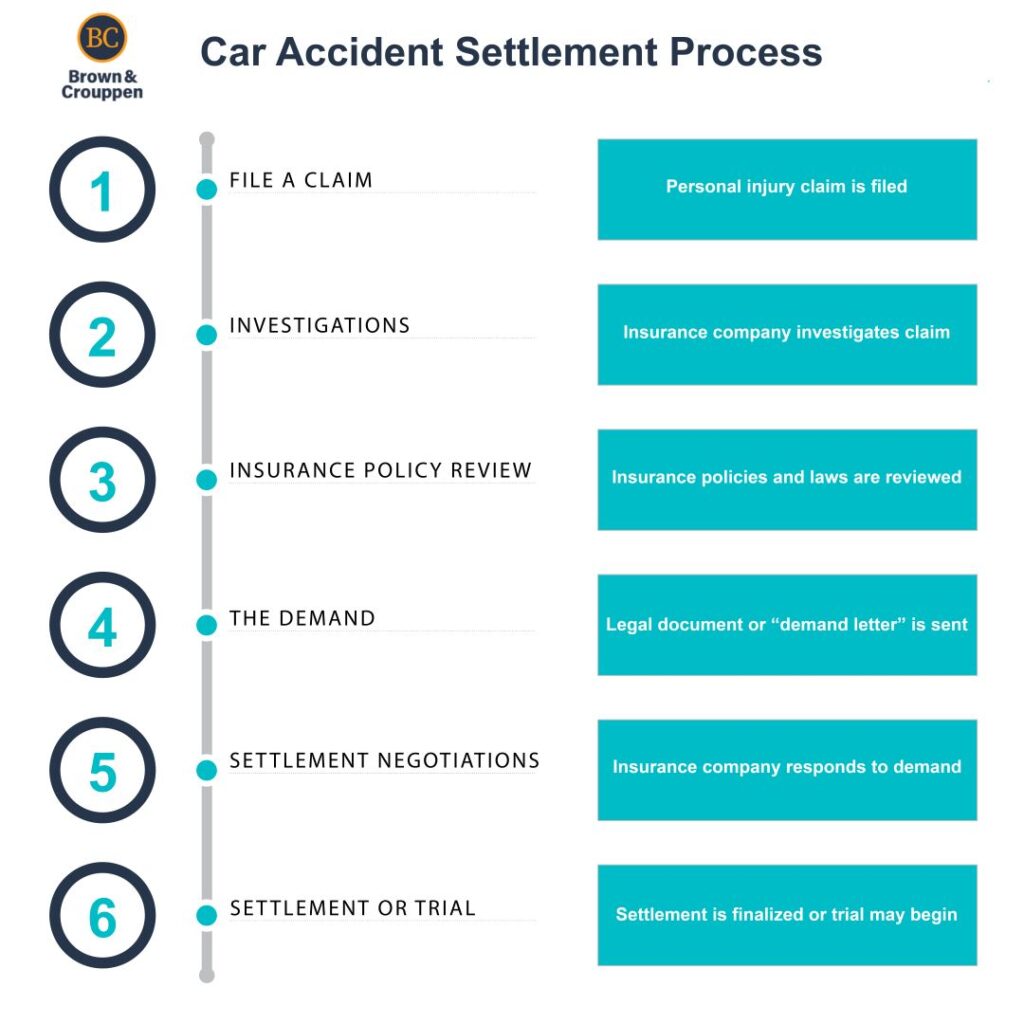Diving into the world of car accident insurance settlement process, this article aims to shed light on the intricate steps and factors involved. Get ready to uncover the essential information needed to understand this crucial process.
Overview of Car Accident Insurance Settlement Process

When involved in a car accident, navigating the insurance settlement process can be overwhelming. It is crucial to understand the key steps involved in order to ensure a fair and timely resolution.
Typical Steps in the Process:
- Reporting the Accident: The first step is to report the accident to your insurance company and provide all necessary details.
- Investigation: The insurance company will conduct an investigation to determine liability and assess the damages.
- Evaluation of Damages: Once the investigation is complete, the insurance company will evaluate the damages and determine the compensation amount.
- Negotiation: There may be negotiations between the parties involved to reach a settlement amount that is acceptable to all.
- Settlement: Once an agreement is reached, a settlement will be made to cover the damages and any medical expenses.
Importance of Understanding the Process:
Understanding the car accident insurance settlement process is crucial for individuals involved in accidents as it helps them navigate the complexities of dealing with insurance companies. It ensures that they are aware of their rights, responsibilities, and the possible outcomes of the settlement process.
Documentation Required for Insurance Claims
When filing a car accident insurance claim, there are several essential documents that you will need to provide to support your case and ensure a smoother claim settlement process. These documents serve as evidence of the accident, damages, and other pertinent information required by the insurance company.
Essential Documents
- Police Report: A copy of the police report detailing the accident is crucial for verifying the incident and determining fault.
- Driver’s License and Insurance Information: Provide your driver’s license, insurance policy details, and contact information to confirm your identity and coverage.
- Medical Records: Any medical reports, bills, and receipts related to injuries sustained in the accident should be included to demonstrate the extent of harm and treatment received.
- Photographic Evidence: Photos of the accident scene, vehicle damage, injuries, and road conditions can provide visual support for your claim.
- Witness Statements: Statements from witnesses who saw the accident occur can corroborate your account of events and strengthen your case.
- Repair Estimates: Obtain estimates for vehicle repairs from reputable auto body shops to assess the cost of damages.
Tips for Organization
- Keep all documents together in a safe and easily accessible place to prevent loss or misplacement.
- Create digital copies of all paperwork and store them securely to have backups in case of emergencies.
- Maintain a detailed log of all communications with the insurance company, including phone calls, emails, and letters, for reference purposes.
- Organize documents chronologically to track the progression of your claim and ensure nothing is overlooked during the settlement process.
Factors Influencing Settlement Amount

When it comes to determining the final settlement amount in a car accident insurance claim, several key factors come into play. These factors can significantly influence the outcome of the settlement and the compensation you receive. Let’s delve into the main elements that impact the settlement amount.
Fault Determination
Determining fault in a car accident is crucial in the settlement process. If you are found to be partially or fully at fault for the accident, it can affect the amount of compensation you receive. Insurance companies will assess the evidence, such as police reports, witness statements, and other documentation, to determine liability.
The more at fault you are, the lower your settlement amount is likely to be.
Injuries
The extent and severity of injuries sustained in a car accident play a significant role in determining the settlement amount. Medical records, treatment plans, and expert opinions are considered when evaluating the impact of injuries on your life. Severe injuries that result in long-term disabilities or require extensive medical treatment will generally lead to higher settlement amounts to cover medical expenses, lost wages, and pain and suffering.
Property Damage
Property damage, including damage to vehicles and other personal property, is another factor that affects the settlement amount. The cost of repairs or replacement of damaged property will be factored into the overall compensation package. Additionally, the value of the vehicles involved in the accident and any personal belongings affected will be considered in determining the settlement.
Insurance Coverage
The insurance coverage of the parties involved in the accident also plays a role in the settlement amount. The policy limits of the at-fault driver’s insurance, as well as your own insurance coverage, will impact the maximum amount of compensation available.
If the at-fault driver is underinsured or uninsured, it may limit the amount you can recover, depending on your policy’s uninsured/underinsured motorist coverage.
Role of Legal Representation
Having legal representation can significantly impact the negotiation of a higher settlement amount. Experienced personal injury attorneys understand the intricacies of the legal system and can advocate for your rights effectively. They can negotiate with insurance companies on your behalf, gather evidence to support your claim, and ensure that you receive fair compensation for your damages.
Legal representation can make a substantial difference in the final settlement amount you receive.
Negotiation Strategies for Maximizing Settlement

In the process of negotiating a car accident insurance settlement, it is crucial to employ effective strategies that can help you maximize the amount you receive. By preparing a strong case and being well-informed about your rights, you can navigate the negotiation process more confidently and potentially secure a better outcome.
Here are some key strategies to consider:
Know Your Rights and Case Strength
- Before entering negotiations, thoroughly understand your insurance policy coverage, state laws, and rights as a policyholder.
- Gather all relevant documentation, such as medical records, police reports, witness statements, and photos of the accident scene, to support your claim.
- Highlight any factors that demonstrate the other party’s liability and your damages, such as clear evidence of negligence or extensive medical bills.
Maintain Clear Communication
- Communicate confidently and assertively with insurance adjusters or legal representatives, emphasizing the strength of your case and the validity of your claim.
- Respond promptly to any requests for information or documentation, and keep a record of all communication in writing.
- Avoid providing recorded statements or signing any settlement offers without fully understanding the terms and consulting with a legal professional.
Explore Alternative Dispute Resolution
- If initial negotiations stall or the offered settlement amount is insufficient, consider alternative dispute resolution methods like mediation or arbitration.
- These processes can sometimes lead to more favorable outcomes and allow for a more collaborative approach to resolving disputes.
- Be open to compromise but maintain a firm stance on receiving fair compensation for your injuries and losses.
Concluding Remarks
Wrapping up our discussion on the car accident insurance settlement process, we’ve explored the key aspects that individuals need to know. Stay informed and prepared for any future encounters with insurance claims.
Quick FAQs
What documents are essential for a car accident insurance claim?
Documents like the police report, medical records, and insurance information are crucial for a successful claim.
How do factors like fault determination affect the settlement amount?
The determination of fault can significantly impact the final settlement amount, as it dictates the level of liability.
What negotiation strategies can help maximize the settlement?
Being prepared, knowing your rights, and staying firm in negotiations can all contribute to achieving a higher settlement amount.









